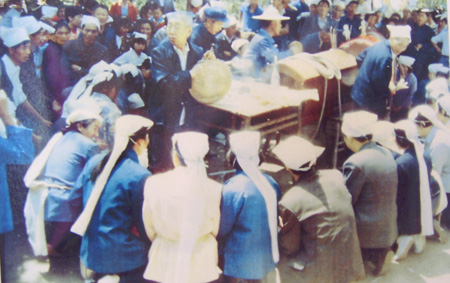Since the breath is gone, the funeral custom of Jing-Chu is initiated. The procedures are as follows:

(1) To burn “joss paper”: family members of the deceased will place in front of the deathbed an earthen basin, in which joss paper or heaven banknotes are burnt with the wish that the dead can “go to heaven with enough money”.
(2) To clean the body: family members of the deceased will clean the dead’s body with a white cloth and clean water, usually limited to “San Fu Zi”, meaning to soak and dry the white cloth three times when cleaning. The first time is to clean the head and face; the second time, to clean the chest and abdomen; the third, to clean the legs and feet. “Body-cleaning” is also called “easing the grief of bereavement”.
(3) To change the clothes: to get the deceased well dressed. If he/she dies young with parents alive, mourning-band should be worn on the arms; if he/she dies old, the trouser belt is twined and twisted with white cotton thread, and the count of the twines is determined by the age. To change the old people’s clothes is also called “shroud-wearing”.
(4) To mourn: to place the dead in the deathbed behind the white drapery of the mourning hall. On the altar, there is candlestick, incense pot and the portrait of the dead. The womenfolk of the immediate family will tell the life story of the dead while crying with great sadness and sorrow, the contents of which more often than not are the hardships undergone by the dead. This is called “mourning the dead”.
(5) To hold a funeral procession: means to carry the coffin to a cemetery. While “moving the dead’s coffin or ashes to the graveyard”, the sons in mourning should break the earthen jar for joss paper right in front of the altar, which is called “jar-toss”. Those who carry the coffin usually are eight strong men, with the relatives of the dead excluded. “Holding a funeral procession”, also known as “attending burial ceremony”, sometimes asks Taoist priests to “carve out a way” with peach-sword, with sons in mourning leading the way and all the close relatives and good friends accompanying all the way to the cemetery.
(6) To set spirit tablet and to visit the grave: after the burial of the dead, the family sets a spirit tablet on the left of the mourning hall, known as “spirit-tablet-setting”; three days later, the family members sacrifice and renovate the tomb for the dead, which is called “grave-visiting”. Counted from the death date of the deceased, the family members light candles and burn incense at the altar to hold memorial ceremony at every time interval of seven days. The practice is conducted till the fifth time interval of seven days, which is known as “Five-Sevens”. After 3 years filial piety period, the spirit tablet is removed, known as “spirit-tablet-removing”.